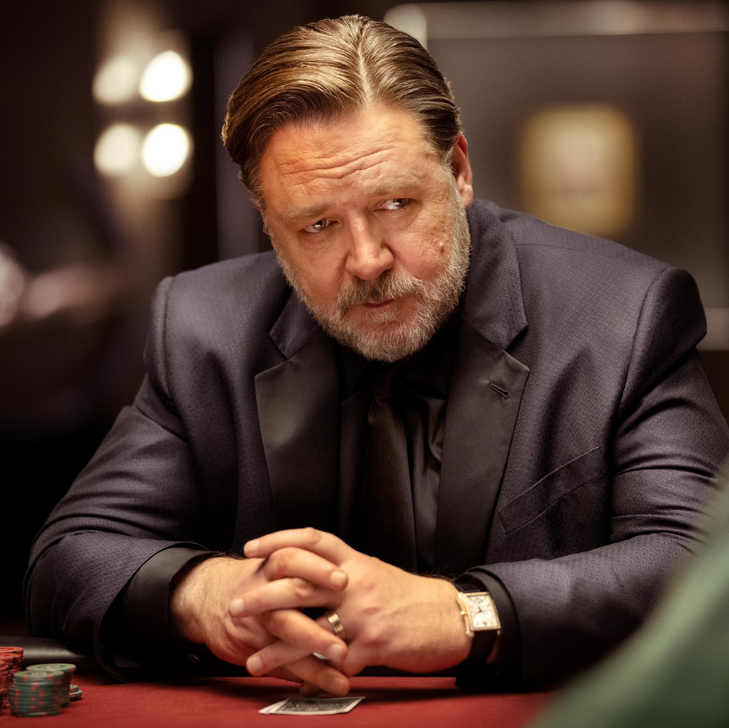Plot: In Poker Face, tech billionaire Jake Foley organizes a high-stakes poker game with his childhood friends. However, things go awry when the event is revealed to be a ploy to get them to reveal their lifelong secrets, not wanting to wait around for them to unfold after being diagnosed with inoperable pancreatic cancer. As the night goes on, more trouble brews as a robbery takes place, and the friends and Jake’s family must find a way to survive.
Review: Poker films often revolve around the game’s energy, and Poker Face is no exception. However, the luxurious setting, dramatic premise, and the movie’s ambitious plot put the action at center stage, often at the expense of depicting a more realistic game. The numbers are high, with $5 million chips on the line to heighten the stakes. Players indulge in expensive drinks while playing and discussing their extravagant anecdotes at the table.
The night also highlights the lavish lifestyle Jake Foley (Russell Crowe) is living, from giving players the chance to keep expensive cars to showcasing his extensive art collection in his gated mansion. Despite the depiction of borderline-ridiculous luxury that’s meant to amp up the stakes and set up the real reason why the game has been held, the reveals are ultimately anticlimactic.
Foley casually mentions that he’s poisoned them, and one by one, each divulges a secret they’ve been keeping. It also doesn’t help that the build-up is painfully slow and vague, aside from the exposition dump at the beginning. The idea of a poker game promises action, but the scenes are clunky and don’t take advantage of the momentum and stakes that can push the players to a tipping point.
Poker Face revolves around Jake Foley’s high-stakes poker game, and he’s only able to host such a lavish gathering thanks to the wealth he’s built from playing online poker. He and his friends played all kinds of variants, from Texas Hold ’em to Five-Card Draw. However, the online scene was where they thrived, and they were the first to create an online poker system in 1994 after experimenting with writing programs to adapt to their preferences. Between playing poker and programming the system, he amassed a fortune.
Though the movie plays into typical cinematic drama, it’s not unrealistic for players to win by playing online. His story is reminiscent of the American online poker scene, which now hosts massive tournaments. The leading US poker site, Americas Cardroom, is known for its extensive tourney offerings with significant guarantees. Americas Cardroom Team Pro, Chris Moneymaker, is also a testament to the impact of online poker. His 2003 World Series of Poker win kicked off the poker boom and was especially memorable since he qualified for his spot through an online tournament and remains a successful player in the present.
Today, players can join events like the site’s Dual Venom tournaments, with up to $12 million in guaranteed prizes. Foley’s online poker fortune isn’t far from what players might experience in the real world, but the film still adds an over-the-top cinematic flair.
In addition to poker, the film wants to do too many things at once. The heist thriller part doesn’t kick off until an hour into the film, and much of it sees the main ensemble huddled in a panic room while the thieves assess the art’s value. Things get even more complicated when Foley’s wife, who has been having an affair with one of his friends, and his only daughter, grappling with the news of his sickness, arrive at the mansion and are immediately taken hostage. Once Foley arrives at the scene, a long and drawn-out stand-off between him and the main antagonist, Victor, occurs while his family drama unfolds, creating an uncomfortable scene with misplaced conversations that continue to make the film’s project muddled and confusing. It wants to be a high-stakes poker film, a family drama, a coming-of-age movie that showcases the changing nature of friendship as life goes on, and an action-packed heist flick. Unfortunately, the film doesn’t deliver on any of them.
Poker Face is Russell Crowe’s second venture into directing; his first stint was with The Water Diviner. It saw mixed reviews when it was released in 2014, but he’s said it was one of the most satisfying experiences of his career. Though his second try at directing falls flat, it won’t be surprising if he wants to continue honing his skills behind the scenes. Hopefully, he’ll be able to direct with more freedom after being restricted by the pandemic during the production of Poker Face, which was a likely culprit for much of the film’s struggles.
Check out more action film news and reviews at The Action Elite.






